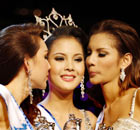-
-
China Daily E-paper
Op-Ed Contributors
Ricci, relevance of tolerance
By Chen Longxiang (China Daily)
Updated: 2010-05-06 08:02
 |
Large Medium Small |
Ricci's journey began in Lisbon, Portugal, in 1578. He traveled via India and reached Macao in 1582 where he applied himself to the study of Chinese language and customs. "Like other Europeans, before dealing directly with Chinese people, Ricci could rely only on his European experience and the ideas and practices left by his predecessors to understand China," Zhang says.
Ricci was different from many Europeans traveling to China, but he could retain or renounce the experiences he had acquired from his predecessors only after being exposed to Chinese culture. His respect for Chinese culture and customs, and his keen insight played a big role in it, though.
Ricci founded the Jesuit tradition of learning the Chinese language and Confucian classics. "Seeing that Chinese culture was strongly intertwined with Confucian values, he realized Christian teachings could be presented as Confucian principles, such as filial piety, reciprocity and personal virtue."
His first book written in Chinese, Treatise on Friendship, (Jiaoyou Lun), in which he says, "My friend is not another person but my second self, so I shall treat my friend just like myself," won him the trust of many Chinese scholars and officials. His knowledge and appreciation of Chinese culture made some Chinese scholar-bureaucrats who came in close contact with him think that he was a "Western Confucian" and came from a "Far Western" state of etiquette, Zhang says.
Instead of excluding traditional Chinese culture, Ricci tried to link Catholicism with Confucianism delicately and use existing Chinese concepts to explain Christianity so that the Jesuits and the Catholic faith they preached could no longer be considered foreign or harmful.
"In other words, the ultimate goal of Ricci's cultural accommodation policy was to integrate Chinese culture and Catholicism and establish a synthesis of Confucian ideology and Catholicism." He initiated the practice of attracting Chinese interest in Christianity by first intriguing them with Western curiosities, including chime clocks, mathematical and astronomical instruments, oil paintings and world maps.
"From the perspective of cultural exchange, Ricci's approach has far-reaching implications in terms of culture innovation. It is a pioneering exploration on cross-cultural collaboration with a breakthrough in the practice of equality and against cultural parochialism." His approach has been preserved as a basic policy of religious integration, which paved the way for the establishment and development of Catholicism in China.









